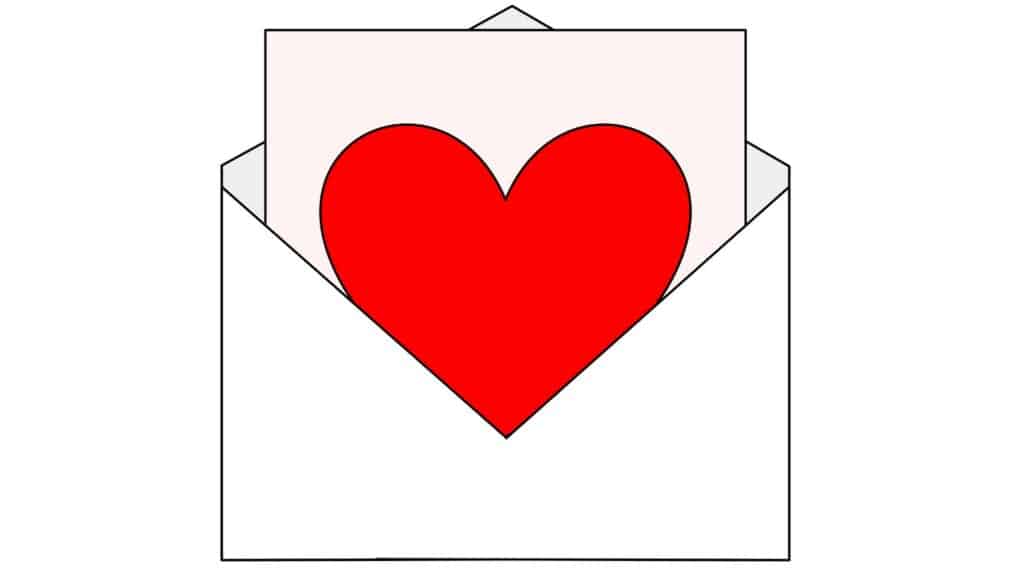“You are not alone” is a European Jewish Association initiative that encourages the public across Europe to write short messages of support to families in Israel suffering under hundreds of indiscriminate rocket attacks on towns and villages. Families who feel isolated and unsupported as the world looks on passively.
By writing a short personal message you can show you care. That you stand with them, that “you are not alone”.
Each and every message sent through the portal on our dedicated webpage will be translated into Hebrew, then delivered and shared to the areas most under fire, offering comfort and support to those taking shelter with their families.
It only takes a minute to show you care. And it’s a minute that means so much.
To send a message klick HERE

Additional Articles
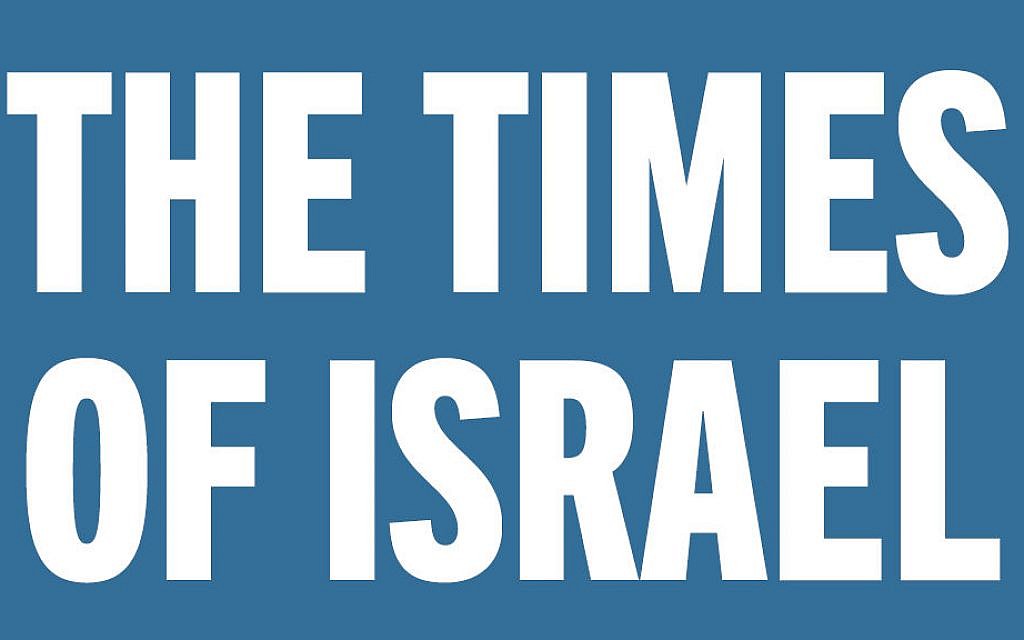
European Jewish leaders gather in Portugal’s Porto to observe community’s revival
PORTO, Portugal — Dozens of European Jewish community leaders convened in the Portuguese city of Porto on Monday for a conference on communal strategies, including lessons from how the city’s local Jews have attracted hundreds of new congregants.
“The leaders of the Jewish community of Porto can be a great example of how just a few individuals who believe in Judaism, in the future of Jewish life, can do magnificent work,” said Rabbi Menachem Margolin, the director of the European Jewish Association, a Brussels-based lobby group that hosted the conference in Porto.
Comprising about 1,000 members, the Jewish community of Porto has tripled in size in recent years, partly thanks to the passage in 2015 of a law that gives Portuguese citizenship to descendants of Jews who were expelled from the country during the Inquisition, which began in Portugal in 1536.
Aided by the boost in membership and by the arrival of hundreds of French-Jewish students at the local university, the community in recent years has augmented its synagogue — which for decades had been its sole possession — with a museum, a kosher meat shop, another synagogue and a Jewish cemetery.
- May 17, 2023
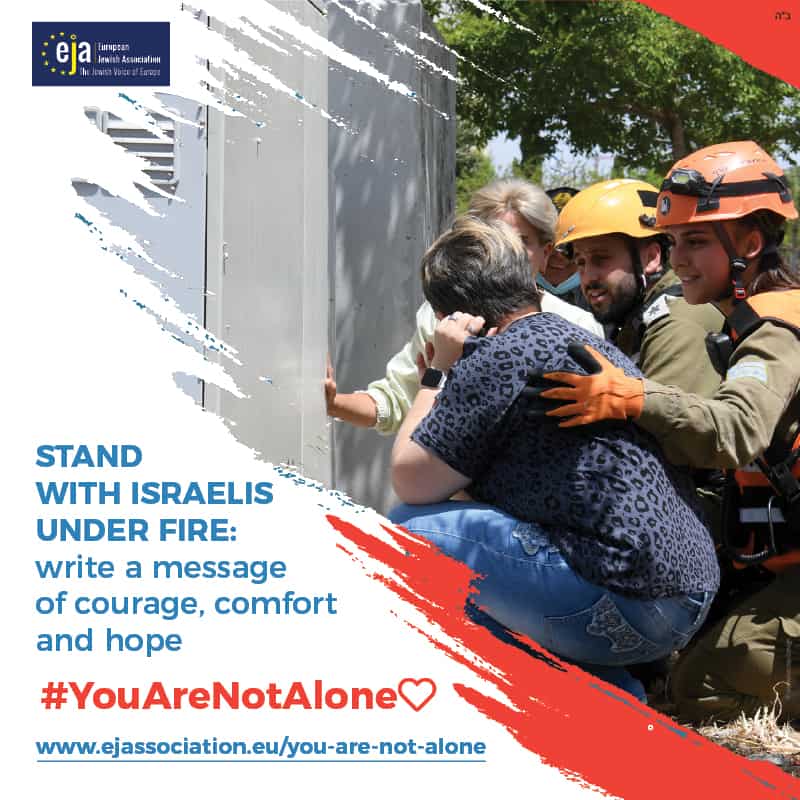
Israel #YouAreNotAlone
Please share far and wide. And take a minute yourselves to write a message.
#YouAreNotAlone – Supportive messages for Israelis under fire.
“You are not alone” is a European Jewish Association initiative that encourages the public across Europe to write short messages of support to families in Israel suffering under hundreds of indiscriminate rocket attacks on towns and villages. Families who feel isolated and unsupported as the world looks on passively.
By writing a short personal message you can show you care. That you stand with them, that “you are not alone”.
Each and every message sent through the portal on our dedicated webpage will be translated into Hebrew, then delivered and shared to the areas most under fire, offering comfort and support to those taking shelter with their families.
It only takes a minute to show you care. And it’s a minute that means so much.
www.ejassociation.eu/you-are-not-alone/
- May 14, 2021
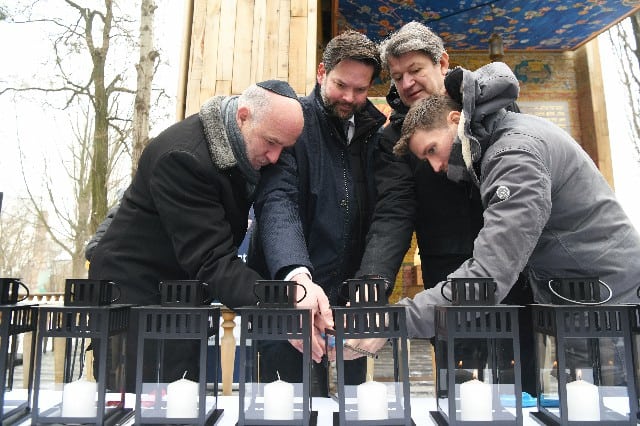
80 years after Babyn Yar massacre: tools to keep the memory alive, learn the lessons
For two days, September 29 and 30, 1941, 33,771 people were exterminated. More than thirty thousand of them were Jews.
A zoom press conference was dedicated on Tuesday to the 80th anniversary of the Babyn Yar massacre ahead of an event “Lessons from Babyn Yar: History, Memory and Legacy” which is jointly organised by the House of European History in Brussels and the Kiev-based Babyn Yar Holocaust Memorial Center (BYHMC).
The conference, organized in cooperation with the European Jewish Asociation, discussed lessons 80 years later, as well as unveiling new and unique tools to keep the lessons, history and memory alive, including actually putting faces and names to those murdered for the first time.
Among the speakers, French Father Patrick Desbois, founder of Yahad-In Unum and head of the scholarly council of BYHMC, stressed that Babi Yar was a criminal site where the genocide of the Jewish people took place in the center of a large city in a large country (Kiev, today Ukraine).
‘’The locals willingly aided the young fascists. The gunmen were given sandwiches and tea with little vodka in it as the mass executions lasted many hours,’’ he noted.
Father Patrick asked a practical question: where did the tons of items and valuables taken from the Jews before their execution go? ‘’It would seem that everything should be documented, but it is easier to find detailed evidence and statistics of the shootings than information about the confiscated property of those killed. It was as if the Germans were embarrassed to write about such facts.’’
He added, ‘’For me, this is another terrible evidence of the Babi Yar tragedy: human life is reduced to zero. It is only the result of statistics, nothing more. Even more terrible is that the USSR, on whose territory the tragedy took place, tried to hide the truth about Babyn Yar for a long time. Nevertheless, our generation has a goal: to find the hidden facts and restore the history of this bloody genocide.’’
“I visited Raka in Syria where there was a mass grave. Journalists came, journalists went. Perhaps in 80 years there can be a debate about what is a ‘fitting’ memorial. What is important is keeping the memory and lessons alive,’’ stressed Father Desbois.
One of the panelists, Marek Siwiec, Director of European Affairs at BYHMC, provided information about many ongoing projects, each of which can contribute to the restoration of the truth about Babyn Yar.
Colossal work has been done: out of more than 33,000 dead, 28,428 names have been identified, and essential family and personal facts have been restored. All these invaluable findings became the basis of a vast program titled “Project Names.”
‘’It brought us closer to the real life of those who were shot at Babi Yar. They say that the death of one person is a tragedy, but the death of tens of thousands is a statistic,’’ said Siwiec, who is a former member of the European Parliament.
‘’Project Names’’ allows us to turn dry statistics into pain for everyone who was left in that terrible place, who did not live, who did not love, who did not leave their continuation on earth,’’ he added.
Another project mentioned by Siwiec, “Red Dot” (Red Dot Remembrance), is unique: more than 3,000 people provided information about the WWII war crimes. This app has so far registered 2,850 sites across of Europe of the ‘Holocaust by bullets’ which enables users to see and learn what took place wherever they are.
‘’These are mass extermination sites, eyewitness accounts, evidence supported by documents, which were kept with German punctuality and pedantry throughout the war,’’ explained Siwiec.
On the Babyn Yar massacre anniversary date of 29th September, 15,000 schools in Ukraine will participate in a “lessons of the Holocaust Day”.
‘’The key word underpinning all of our activities is education. It is only through education that the tragic disasters of the past can never be repeated,” said Siwiec.
Marek Rutka, a member of the Sejm, the Polish parliament, and chairman of the parliamentary group for the commemoration of the crimes at Babyn Yar and for a Europe free from genocide and hatred, explained that members of his political party regularly visit the sites of the Shoah executions. ‘’They see heartfelt tragedies lead to politically literate conclusions about the need to talk about the Shoah on a European scale. There is no genocide without the tolerance of neighboring countries. These words can be taken as a motto for the whole debate.’’
Anton Schneerson, who contributed this article for European Jewish Press, is a Ukrainian Jew living in Germany. The Jewish community of his hometown, Dnipro, managed to build one of the world’s most prominent Holocaust museum that deeply covers the Babyn Yar tragedy.
https://ejpress.org/80-years-after-babyn-yar-massacre-tools-to-keep-the-memory-alive-learn-the-lessons/
- January 28, 2022
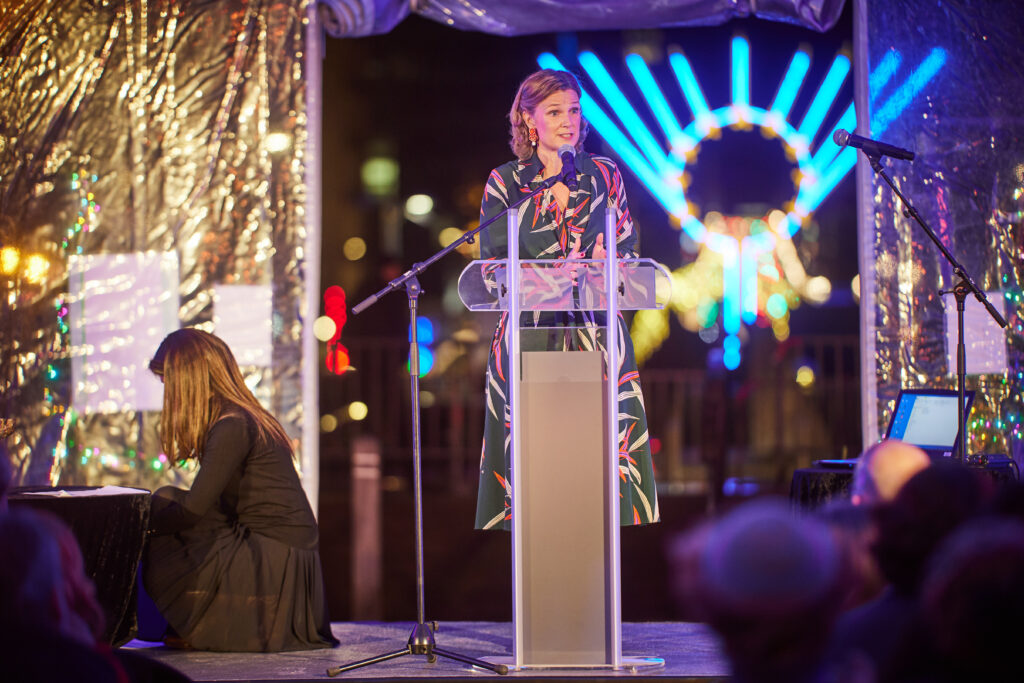
European Commission head to light Chanukah candle on Rond-Point Schuman in Brussels’ EU quarter
The President of the European Commission, Ursula von der Leyen, will celebrate Chanukah on Monday 19 December by lighting the flame on a large menorah in front of the European Commission’s headquarters in the Brussels EU quarter.
As part of the cultural agenda of Brussels, the city’s Mayor Philippe Close will light the second candle of Chanukah.
The event is seen as a strong sign for the European Jewish community in the wake of the EU’ clear commitment to ensuring a Jewish future and fostering Jewish life as laid out in the EU Commission’s new strategy for combatting resurgent antisemitism and fostering Jewish life in Europe.
European ambassadors and civil servants are expêcted to attend the event.
The lighting, which is organized in partnership with the European Jewish Association and the City of Brussels, will take place on Monday at 18:00 on Schuman Square and will be followed by a concert from the singer Haim Tzvi.
Chanukah, the Jewish festival of lights, is one of the most popular Jewish holidays worldwide. Candles are lit over 8 days to remember the miracle of one day’s worth of oil lasting eight following the reconsecration of the Temple in Jerusalem. Its message of hope, light and emancipation resonates are universal and timely. Celebrations worldwide are attended by heads of states who often light their own candles.
In addition to Monday’s lighting, Chanukah will also be celebrated the next day in the European Commission with the presence of the European Commissioner Janez Lenarčič, honoring Hias Europe, the world’s oldest refugee organisation, first established in the 1880s to help Russian Jews fleeing from pogroms resettle in the United States. Since then, HIAS Europe has had a strong presence throughout Europe, resettling hundreds of thousands of European Jews fleeing from violence and conflict. Today, HIAS Europe is a global humanitarian organization with thousands of employees in 22 countries dedicated to helping forcibly displaced persons, irrespective of their background. During more than a century of activity, HIAS Europe has helped more than 4.5 million people escape persecution worldwide »
EuroChanukah is organised every year by the European Jewish Community Centre (EJCC).
- December 22, 2022

